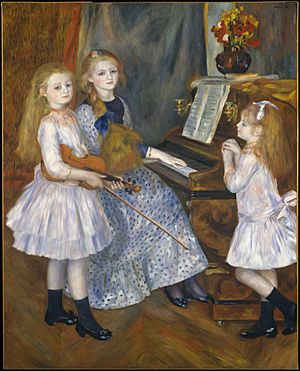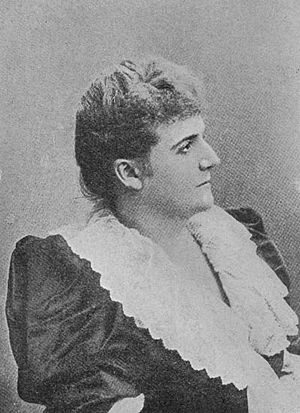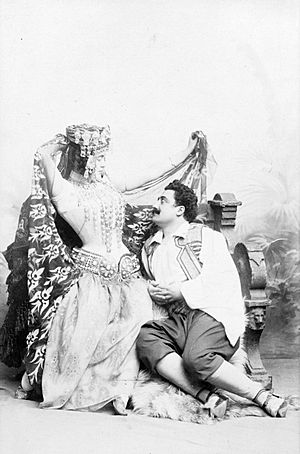Augusta Holmès facts for kids
Augusta Mary Anne Holmès (born December 16, 1847 – died January 28, 1903) was a French composer. Her family was from Ireland, and she became a French citizen in 1871. Augusta wrote the words for almost all of her own songs and other vocal music. This included her opera La Montagne noire and the story-based poems for her orchestral pieces like Irlande.
Contents
About Her Life
Augusta Holmès was born in Paris. She was the only child of Charles William Scott Dalkeith Holmes and Tryphina Anna Constance Augusta Shearer. A famous poet named Alfred de Vigny was her godfather.
Even though Augusta was very talented at playing the piano, she wasn't allowed to study at the famous Paris Conservatoire. Instead, she took private lessons. She learned piano from teachers like Mademoiselle Peyronnet, Henri Lambert, and Hyacinthe Klosé. She even showed some of her early musical pieces to the famous composer Franz Liszt. Around 1876, she began studying with César Franck, who she considered her most important teacher.
Camille Saint-Saëns, another well-known composer, once wrote about Holmès: "Like children, women have no idea of obstacles, and their willpower breaks all barriers. Mademoiselle Holmès is a woman, an extremist." In the 1800s, many women composers, like Fanny Mendelssohn and Clara Schumann, sometimes used male names for their early works. This was because society at the time often didn't take women artists seriously. Augusta Holmès also used a male name, "Hermann Zenta,", for some of her first pieces.
For the 100th anniversary of the French Revolution in 1889, Augusta Holmès was asked to write a special piece called Ode triomphale. This huge musical work was performed at the World's Fair and needed about 1,200 musicians! She became known for writing "programme music" – music that tells a story or has a specific meaning. Her pieces like Irlande and Pologne were examples of this, often with political messages.
Her Family Life

Augusta Holmès had five children with the poet Catulle Mendès. Her children included:
- Huguette Mendès (1871–1964)
- Claudine Mendès (1876–1937)
- Helyonne Mendès (1879–1955)
When Augusta Holmès passed away, she left most of her musical writings to the Paris Conservatoire.
Some of Her Music
Operas
- Héro et Leandre (1875) – a short opera
- Lancelot du lac – an opera that was not published
- La Montagne noire (1885) – performed in Paris in 1895
Cantatas (Vocal and Orchestral Works)
- Astarté (1871) – a musical poem
- Lutèce (1877) – a dramatic symphony
- Les Argonautes (1880) – a dramatic symphony
- Ludus pro patria (1888) – an ode-symphony
- Au pays bleu (around 1888) – a symphonic suite
- Une Vision de Sainte Thérèse (around 1888) – for a female singer and orchestra
- Ode triomphale en l'honneur du centenaire de 1789 (1889) – a triumphant ode for the 1789 centennial
- Hymne à la paix (1890) – a hymn to peace
- Hymne à Apollo (around 1890s) – a hymn to Apollo
- La Belle au bois dormant (1902) – a lyrical suite based on Sleeping Beauty
- La Vision de la reine – a cantata
Orchestral Music
- Ouverture pour une comédie (before 1870) – a symphonic poem
- Roland furieux (1876)
- Irlande (1882) – a symphonic poem about Ireland
- Andromède (1883) – a symphonic poem
- Pologne (1883) – a symphonic poem about Poland
- La Nuit et l'amour (1888) – "The Night and Love"
Chamber Music (for Small Groups of Instruments)
- Minuetto (1867) – for a string quartet
- Trois petites pièces (1879) – three small pieces for flute and piano
- Fantaisie in C minor (1900) – for clarinet and piano
- Molto lento – for clarinet and piano
Piano Music
- Rêverie tzigane (1887) – "Gypsy Dream"
- Ce qu'on entendit dans la nuit de Noël (1890) – "What Was Heard on Christmas Night"
- Ciseau d'hiver (1892) – "Winter Chisel"
Songs and Song Collections
- Les Sept ivresses (1882) – "The Seven Drunkennesses," a collection of songs about different feelings like love, wine, glory, hate, dreams, desire, and gold.
- Trois Chansons populaires (1883) – three popular songs.
- Noël: Trois anges sont venus ce soir (1884) – "Christmas: Three angels came tonight."
- En Chemin (1886) – "On the Way."
- Hymne à Eros (1886) – "Hymn to Eros."
- Fleur de neige (1887) – "Snow Flower."
- La Chanson de gas d'Irlande (1891) – "The Song of the Irish Lads."
- Berceuse (1892) – a lullaby.
- Contes divines (1892–1895) – "Divine Tales," a collection of songs including "The Hawthorn of Saint Patrick" and "The Blue Lilies."
- Noël d'Irlande (1896) – "Christmas in Ireland."
See Also
 In Spanish: Augusta Holmès para niños
In Spanish: Augusta Holmès para niños
 | Precious Adams |
 | Lauren Anderson |
 | Janet Collins |



